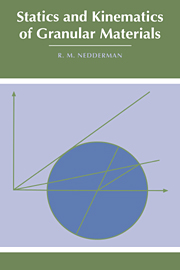Book contents
- Frontmatter
- Contents
- Notation
- 1 Introduction
- 2 The analysis of stress and strain rate
- 3 The ideal Coulomb material
- 4 Coulomb's method of wedges
- 5 The method of differential slices
- 6 Determination of physical properties
- 7 Exact stress analyses
- 8 Velocity distributions
- 9 The Conical yield function
- 10 The prediction of mass flow rate
- Set problems – chapters 2–10
- Appendices
- References and bibliography
- Index
3 - The ideal Coulomb material
Published online by Cambridge University Press: 28 October 2009
- Frontmatter
- Contents
- Notation
- 1 Introduction
- 2 The analysis of stress and strain rate
- 3 The ideal Coulomb material
- 4 Coulomb's method of wedges
- 5 The method of differential slices
- 6 Determination of physical properties
- 7 Exact stress analyses
- 8 Velocity distributions
- 9 The Conical yield function
- 10 The prediction of mass flow rate
- Set problems – chapters 2–10
- Appendices
- References and bibliography
- Index
Summary
Introduction
In this chapter we will consider the simplest model of a granular material, known as the ideal Coulomb material. It must be appreciated from the outset that this model gives an over-simplified picture of the behaviour of real granular materials and more accurate models will be discussed in chapters 6 and 9. None-the-less, the concept of the ideal Coulomb material forms the basis of a great many analyses of commercial importance and furthermore provides a firm foundation on which to develop important ideas of more general validity. The Coulomb material fulfils the same role in the study of granular materials as the Newtonian fluid does in viscous flow.
We will define the ideal Coulomb material in §3.2 and combine this with Mohr's stress circle in §3.3 to derive the Mohr–Coulomb failure analysis. This analysis is the corner-stone of most studies of stress distribution in granular materials. Following this we will discuss the Rankine states and their implication for the prediction of stresses in §3.4. The concept of an angle of repose and its relationship to the parameters in the Coulomb model will be discussed in §3.5 and §3.6 and finally in §3.7 we will consider the interaction of a Coulomb material with a retaining wall.
The Coulomb yield criterion
The behaviour of a granular material is best understood by comparison with the more familiar behaviour of solids or fluids.
- Type
- Chapter
- Information
- Statics and Kinematics of Granular Materials , pp. 21 - 46Publisher: Cambridge University PressPrint publication year: 1992
- 2
- Cited by



